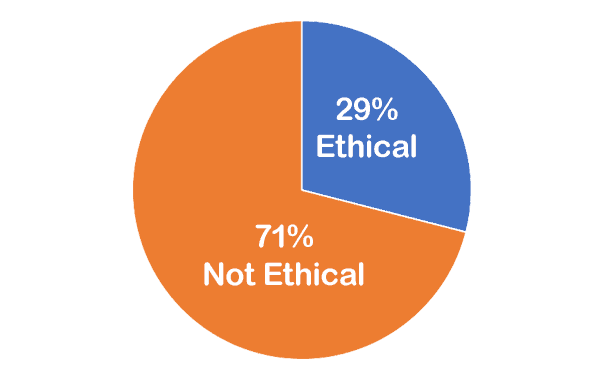This is the July 2023 edition of our monthly series of Ethics case studies titled What Do You Think? This series is comprised of case studies from NSPE archives, involving both real and hypothetical matters submitted by engineers, public officials and members of the public.
Your peers and the NSPE Board of Ethical Review have reviewed the facts of the case as shown below. And, here are the results.
Your opinion has been registered for the July 2023 edition of our monthly series of Ethics case studies titled What Do You Think?
Your vote is recorded as:

Want to know how your peers voted? We’ll send you an email with the poll results on July 25.
Your opinion has been registered for the July 2023 edition of our monthly series of Ethics case studies titled What Do You Think?
Your vote is recorded as:

Want to know how your peers voted? We’ll send you an email with the poll results on July 25.
A Review of the Facts
Engineer Brad is retained by the county to perform a feasibility study and make recommendations concerning location of a new power facility in the county. Two parcels of land located on a river have been identified by the county as the “candidates” for facility sites. The first parcel is undeveloped and owned by an individual who plans to build a recreational home for his family. The second parcel, owned by Brad, is developed.
Brad discloses that he is the owner of the second parcel of land and recommends that the county build the facility on the undeveloped parcel of land because (1) it is a better location for the power facility from an engineering standpoint, and (2) it would be less costly for the county to acquire. The county did not object to having Brad perform the feasibility study.
What Do You Think?
Was it ethical for Brad to perform a feasibility study and make recommendations concerning the location of a new power facility in the county?
Here is the result of our survey of your peers:

Applicable NSPE Code References:
II.4.a
Engineers shall disclose all known or potential conflicts of interest that could influence or appear to influence their judgment or the quality of their services.III.1.b
Engineers shall advise their clients or employers when they believe a project will not be successful.
Discussion
The issue of conflict of interest is one of the most widely discussed and debated in engineering ethics. As a customary proposition, it is generally recognized as good practice for engineers to endeavor to avoid conflicts of interest. However, the language in the NSPE Code of Ethics relating to conflicts of interest has been significantly modified over the years. For many years, the NSPE Code contained strict proscriptions against engineers engaging in conflicts of interest and admonished engineers, in strong language, to avoid such conflicts. While the current language still maintains a strong tone, it is more general than in the past, requiring the disclosure of conflicts rather than complete avoidance.
The Board has had various occasions to interpret the language of the Code of Ethics addressing the subject of conflict of interest. In one such instance, Case 85-6, an engineer was retained by the state to perform certain feasibility studies relating to a possible highway spur. The state was considering the possibility of constructing the highway spur through an area that was adjacent to a residential community in which the engineer’s residence was located. After learning of the proposed location of the spur, the engineer disclosed to the state the fact that his residential property might be affected and fully disclosed the potential conflict with the state. The state did not object to the engineer performing the work. Engineer A proceeded with his feasibility study and ultimately recommended that the spur be constructed.
In ruling that it was not unethical for the engineer to perform the feasibility study despite the fact that his land might be affected thereby, the Board noted that the ethical obligations contained in Code II.4.a. do not require the engineer to “avoid” any and all situations that may or may not raise the specter of a conflict of interest. Such an interpretation of the Code of Ethics, said the Board, would leave engineers without any real understanding of the ethical issues nor any guidance as to how to deal with the problem. We noted that the basic purpose of a code of ethics is to provide the engineering profession with a better awareness and understanding of the ethical issues that impact upon the public. The Board concluded that only through interacting with the public and clients will engineers be able to comprehend the true dimensions of ethical issues.
While one can read Case 85-6 and possibly draw the conclusion that in the present case Brad’s conduct was ethically proper, we do not reach that conclusion. It is our view that the two cases should be distinguished. In Case 85-6, the benefit to be derived by the engineer from the construction of the spur in question was far more remote than the benefit in the case at hand. The construction of the highway spur presumably would add to the value of the engineer’s residential property, but it would not impact upon his ownership of the property.
In the present case, Brad is being placed in a position whereby he is making a recommendation that could directly affect his and his neighbor’s ownership in property. It is one thing for an engineer to participate in decisions that will have a tangential impact upon his interests as was the case in 85-6. It is quite another matter for the engineer to act in his professional capacity to advise a governmental entity on policy matters where his economic interests are directly at issue.
We are reminded that Brad’s professional opinion was supported by two important public policy considerations. First, it was noted by Brad that the undeveloped parcel was a better location for a power facility from an engineering standpoint. Second, it was indicated that the cost to the county of acquiring the developed property would be higher than the cost of acquiring the undeveloped tract of land.
While these two considerations are important ones from a public policy standpoint, and may even be rationalized by a perfunctory reading of Code III.1.b. of the Code of Ethics, they are not sufficient to justify Brad’s decision to perform the feasibility study for the county. Public perceptions play an important role in engineering ethics. The facts and circumstances of Brad’s study may appear to suggest a benefit to the “common good” if his recommended course of action is followed. That notwithstanding, a loss of public confidence may cause a damage that cannot be easily repaired due to the appearance of impropriety.
The far simpler and more ethical approach which we believe should have been followed by Brad, under the circumstances in this case, would be to avoid such a conflict by disposing of his land holdings prior to undertaking the commission or by declining to perform the services if it is not feasible or desirable for him to dispose of his land at the particular time.
The Ethical Review Board’s Conclusion

It was unethical for Brad to perform a feasibility study and make recommendations concerning the location of a new power facility in the county.
BOARD OF ETHICAL REVIEW
Eugene N. Bechamps, P.E.; Robert J. Haefeli, P.E.; Robert W. Jarvis, P.E.; Lindley Manning, P.E.; Paul E. Pritzker, P.E.; Harrison Streeter, P.E.; Herbert G. Koogle, P.E.-L.S., chairman
Note – In regard to the question of application of the Code to corporations vis-a-vis real persons, business form or type should not negate nor influence conformance of individuals to the Code. The Code deals with professional services, which services must be performed by real persons. Real persons in turn establish and implement policies within business structures. The Code is clearly written to apply to the Engineer and it is incumbent on a member of NSPE to endeavor to live up to its provisions. This applies to all pertinent sections of the Code. This opinion is based on data submitted to the Board of Ethical Review and does not necessarily represent all of the pertinent facts when applied to a specific case. This opinion is for educational purposes only and should not be construed as expressing any opinion on the ethics of specific individuals. This opinion may be reprinted without further permission, provided that this statement is included before or after the text of the case.








I disagree on the basic difference in the two cases. In the case cited the construction could have reduced or increased the value of the engineer’s land and was deemed ethical. In this case it was deemed unethical. I find the board’s justification rather ingenious (“public perception”) versus solidly based. If the engineer always declares their potential conflict of interest up front then I think it is up to the client/municipality/court to decide if it is a problem. If there is a public perception issue the fault or concern should rest with them, not the engineer. If the engineer is concerned then they simply should decline the work citing the potential conflict of interest and explaining they do want to deal with it. Normally I find the board’s decision’s very solid and supportable but this time I will disagree. (BTW I would have turned down the job as just being too close to home!)
Any time you have ‘skin’ in the game, I believe you should NOT be involved. Selling the property (Brad’s) would make it worse, because the buyer of Brad’s property would come after him for knowingly selling the property which may be taken over by eminent domain. “I’m selling you the property, but by the way, I may recommend the County take your new property away from you!”
Brad sounds like fine, honest, and upright fella, but there isn’t any way for this situation to avoid the appearance of conflict of interest.
The cost evaluation point in the report of “cheaper” was also highly suspect in a “neutral engineering assessment” of best options pro-cons which as the owner of one option had full fiscal investment in “how much”.
In this day and age, any appearance of unethical or possibly unethical behavior brings disrepute and loss of confidence in the public court of opinion. The client, the engineer, and the profession don’t need that. Brad should have simply said ” I own one of the properties and cannot therefore be used to judge this project.” On boards in the business world, you recuse your self if they are deciding something where you have a business interest. Ditto for judges.
Given the fact that Engineer owns the land in question, it’s not right.
It’s the same reason why companies that install fall protection anchors do not load test the anchors they install.
Both cases scream ‘CONFLICT OF INTEREST’
I disagree with “board of ethics”. Engineer disclosed his ownership of one parcel under consideration. If client doesn’t have an issue with that, that is on them. Second referent isn’t even applicable, in your presentation, at no time was “success” of project even mentioned as a factor.
I also have issue with, despite showing zero evidence that any “rules of ethics” were even bent, the “board” appears to arbitrarily decide that Engineer’s actions were “unethical.” Why bother having “rules” if you aren’t going to follow them?